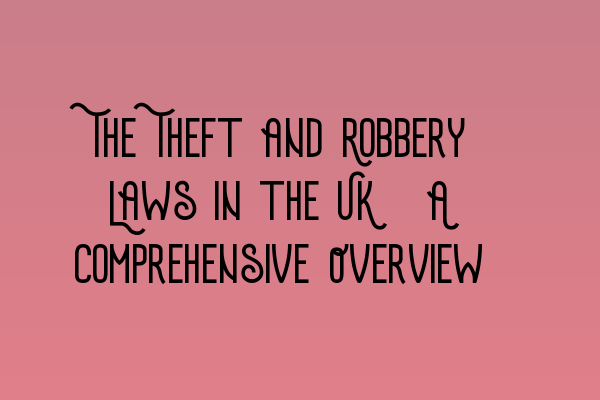The Theft and Robbery Laws in the UK: A Comprehensive Overview
Theft and robbery are serious offences in the UK, carrying with them significant penalties. In this comprehensive overview, we will delve into the intricacies of the theft and robbery laws, ensuring that you have a clear understanding of the legal framework surrounding these crimes. Our expert solicitors at SQE Criminal Law & Practice Law UK are here to provide you with the knowledge you need.
Theft Law in the UK
Theft is the act of dishonestly appropriating property belonging to another person, with the intention to permanently deprive them of it. It is a criminal offence under the Theft Act 1968.
Under the Act, the term “property” includes money, real estate, personal belongings, and intellectual property. The Act also states that appropriation must be done without the consent of the owner. In other words, taking someone’s belongings without their permission constitutes theft.
In addition to appropriation, the Act requires a dishonest intent to permanently deprive the owner of the property. This means that if someone takes property but intends to return it, it may not be considered theft. However, this intention can be inferred from the circumstances.
Robbery Law in the UK
Robbery goes beyond theft and involves the use or threat of force. It is defined as the act of stealing with the intention to use force or cause fear of immediate force. Robbery is also governed by the Theft Act 1968, with more severe penalties due to the added element of violence or threat of violence.
To constitute robbery, three elements must be present:
1. The act of theft
2. The use or threat of force
3. The intention to use force or cause fear of immediate force
Penalties for Theft and Robbery
The penalties for theft and robbery vary based on the severity of the offence and the value or nature of the property involved. In the UK, theft is classified into three categories: petty theft, theft, and high-value theft.
For petty theft, where the value of the stolen property is below £500, the maximum penalty is seven years imprisonment. Theft, where the value is between £500 and £5,000, carries a maximum sentence of 10 years imprisonment. For high-value theft, where the value exceeds £5,000, the maximum sentence increases to 14 years imprisonment.
Robbery, on the other hand, is considered a more serious offence due to the use or threat of violence. Offenders convicted of robbery can face life imprisonment, especially in cases involving firearms or other dangerous weapons.
Defences and Mitigating Factors
There are certain defences and mitigating factors that can be argued in theft and robbery cases. These include:
– Honest belief: If the accused believed in good faith that they had a legal right to the property, they may use this as a defence.
– Duress: If the offender committed the theft or robbery due to threats or coercion by someone else, they may argue that they were under duress.
– Lack of intent: If it can be proven that the offender did not have the intent to permanently deprive the owner of the property, they may be able to use this as a defence.
It is crucial to consult with an experienced criminal law solicitor who can assess your case, advise you on the available defences, and represent you in court if necessary.
In Summary
Understanding the intricacies of the theft and robbery laws in the UK is essential for anyone facing these charges or who wants to stay on the right side of the law. Theft involves dishonestly appropriating property with the intent to permanently deprive the owner, while robbery adds the element of force or threat of force.
Penalties for these offences vary depending on the severity, with robbery carrying more severe penalties due to the added violence. Defences and mitigation can be argued in both theft and robbery cases, making it crucial to seek legal advice if you find yourself involved in such a situation.
At SQE Criminal Law & Practice Law UK, our team of expert solicitors is here to guide you through the legal process, providing you with the best possible defence. Contact us today to schedule a consultation.
